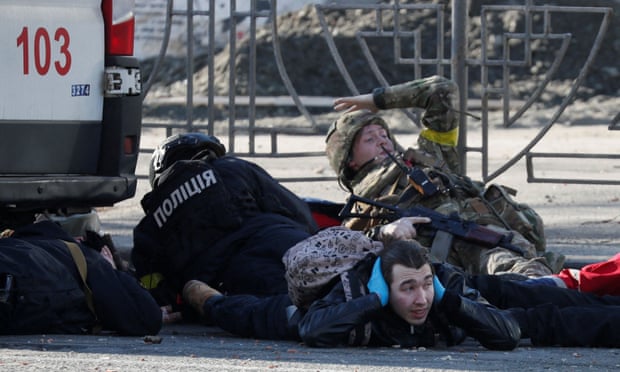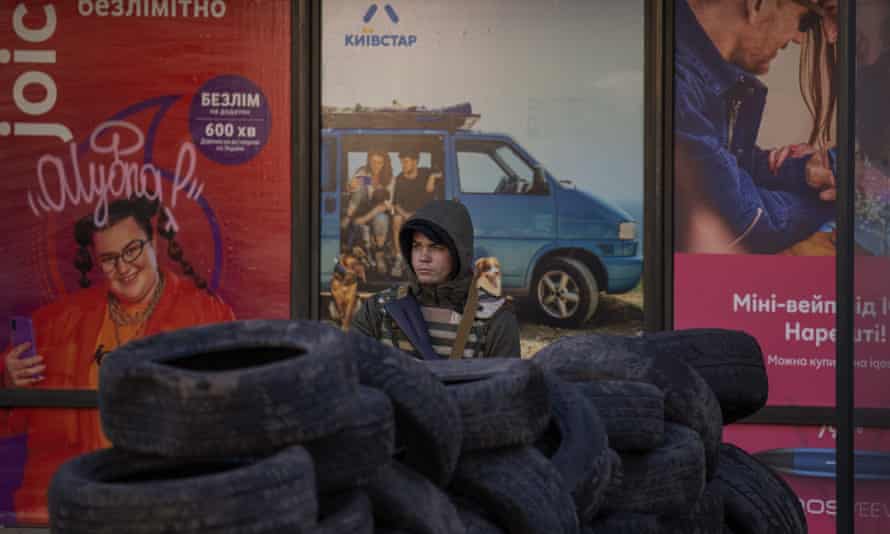Armed with hammers and pistols, Ukrainians wait at barricades for the Russians

People take cover as an air-raid siren sounds in Kyiv on Saturday. Photograph: Gleb Garanich/Reuters
At makeshift checkpoints, motley crews of citizens vow to do everything in their power to halt the Russian advance
The barricade started as a few men waiting nervously in the road on Friday, and grew gradually over the course of Saturday. By the afternoon, this modest attempt to stop a Russian advance on the capital of Ukraine was complete: sandbags, wooden crates and bricks piled high, with a blue-yellow national flag flying above them.
The motley crew had no illusions about the level of resistance they would be able to offer to one of the world’s most ruthless and technologically advanced armies, but like thousands in and around Kyiv they were determined to do what they could anyway. “I practised shooting yesterday and I came out here today for my first shift. I’ll be honest, I’m terrified,” said Alexander, 50. He was brandishing a US-made Remington shotgun he said a friend had acquired for him.

“Of course, if it’s a tank, in this terrain there’s nothing we can do and we need to run. But if it’s anything less than a tank, we will fight.” It was a promise kept by citizens across the capital, as the unthinkable became their reality, and the horror of modern warfare started ripping buildings and lives apart. For two nights Russia had thrown missiles, fighter jets and crack troops at the Ukrainian capital, apparently expecting a rapid capitulation, but Kyiv fought back.
The mood was captured by President Volodomyr Zelenskiy, who posted video updates from the streets of the capital with top officials, attacking false news reports saying that he had fled. When US officials offered to pull him out of the city, he told them “The fight is here: I need ammunition, not a ride,” US media reported.
Recruiting stations were overwhelmed by citizens of all ages, some well into their retirement, signing up to take weapons for the fight. “I planned to plant tulips and daffodils on my backyard today. Instead, I learn to fire arms and get ready for the next night of attacks on Kyiv,” said MP Kira Rudik on Twitter. “We are not going anywhere. This is our city, our land, our soil. We will fight for it. So next week I can plant my flowers. Here.”
Others followed government instructions to start stockpiling molotov cocktails, hunt for Russian saboteurs and, beyond the city centre, take down road signs to confuse an invading army. Yet despite the success holding off the initial Russian onslaught, including during a pitched battle on the main Peremohy or victory avenue, Kyiv braced for worse on Saturday evening after Russia announced it had ordered troops to resume their offensive.Advertisement
In preparation, the metro stopped running, with stations to be used only as air raid shelters, and a curfew brought in from 5pm on Saturday until Monday morning, the mayor announced. Anyone on the streets in that time would be considered a saboteur and could be shot. Bridges across the river Dniepr, which divides the city, were also closed in preparation.
Fuel is now scarce in and around Kyiv and most petrol stations are either out of petrol or are selling it only to Ukrainian soldiers who present identification.
“The capture of Kyiv remains Russia’s primary military objective,” Britain’s defence ministry said in an intelligence briefing. It also said Russia’s advance was slowed “likely as a result of acute logistical difficulties and strong Ukrainian resistance”, but that large numbers of troops were now thought to be just 30 kilometres from the city.
For many in Kyiv the reality of a Russian invasion still felt hard to grasp, even as they adjusted to nights in bunkers, mounting deaths and the images of civilian homes ripped apart by missile strikes.

“It is impossible to imagine that my [aunt’s] mother, who lost her parents and became orphaned at seven, fought against Hitler with the Russian people, had to hide in a haystack from Nazi German soldiers, today, at the age of 85, is hiding in the basement in Kyiv from Russian soldiers,” said activist Valeriia Voshchevska.
The ties between the two countries run so deep that the attack feels fratricidal to many, including the barricade defender Alexander.
Born and raised in Russia, he later moved to Donetsk, where he ran a clothing shop until Russian-backed separatists seized the city in 2014, starting a conflict that laid the groundwork and provided the paper-thin excuse for this year’s invasion. Then, he moved to Kyiv, and now he was fighting forces sent from his former homeland.
“I spoke to my cousin two days ago and he doesn’t understand anything. That will be our last conversation. I asked him: ‘Why are you so cowardly, your country is attacking us with ballistic missiles. Your own father is from Ukraine. Have you gone insane?’”
The power of Russian propaganda narratives meant that there would be no point talking to Russians, except to scream “Get out occupier”, he said. Many unarmed Ukrainians have already risked doing exactly that, with several videos going viral of citizens screaming at recently arrived Russians, often in tirades laced with obscenities. Alexander’s checkpoint, at the entrance to a small village on the outskirts of Kyiv, was one of many that has sprung up on the approach roads to the Ukrainian capital over the past 48 hours, as Russian forces draw closer.
None of those manning it were professional soldiers, and Alexander was one of the better-armed defenders. A few had shotguns, one had a pistol, cackling as he displayed its “Made in Russia” inscription. Others had no firearms at all, but said they would use knives, or a hammer.
The checkpoint defenders had yet to catch sight of any Russian troops or armour, but said they had caught one suspicious man overnight who had been found carrying maps of the area and markers to use for later Russian targeting, and had arrested him and handed him over to police.
In the city, people not heading for the front lines went underground as the curfew brought Saturday to an early end. Within an hour, blasts were once more echoing through the darkness, and the battle for Kyiv joined again.

–The Guardian







